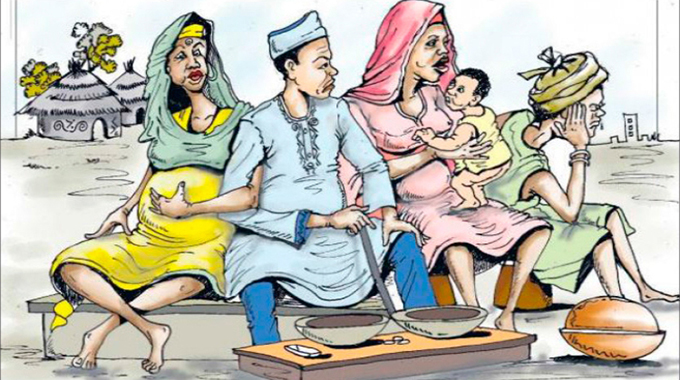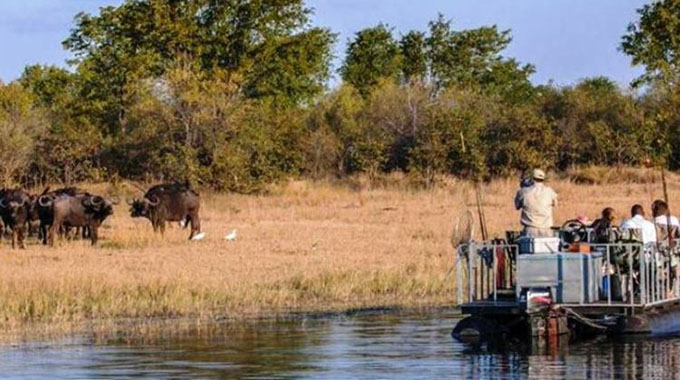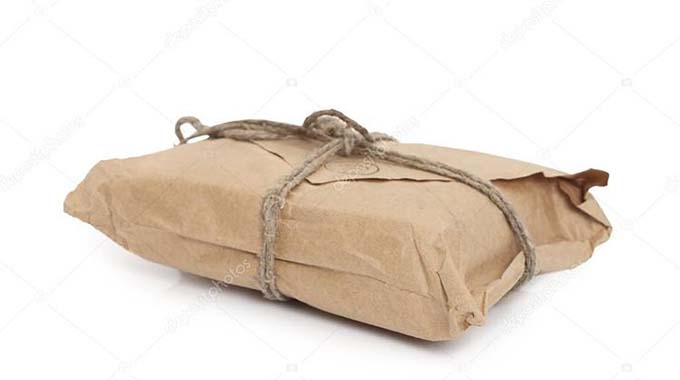Far from the Madding Crowd

retreated to a secluded swathe of land at the mountain top, Far from the Madding Crowd.
Here Michael Duncan and his wife Emmy have lived a happy life, in their equivalent of the Garden of Eden.
With only donkeys for transport, no electricity, no cellphones, no television set, no radio, no conventional medicine, no school for their children, no chemicals for their garden and no brick and tiles but wood and thatch, the Duncan family lives by a small stream.
The stream that never runs dry, flows by the doorstep of their main living house, a one-roomed timber and grass-thatch structure and they have the luxury of using even a cup to fetch water. Their windows have no curtains, for, who peeps at them except their donkeys, goats, sheep, cats and dogs in their remote paradise?
“We are disillusioned with conventional life and this is our reaction to conventional life, which is centred on money and oil. We would rather deal with problems of baboons, rats, mice, worms, moles and aphids than deal with problems brought by conventional life such as running a car, electricity and water bills, and the urban noise. My donkeys are my 4×4 vehicles, they need no fuel, all they do is graze and go,’’ says Mike.
They are probably the only ones still posting letters at Chimanimani Post Office for, that is their only means of communication. Even if there is cellphone network reception at their home, they don’t need it.
Their diet revolves around goat milk, goat milk cheese, and goat meat, natural foods, tubers and roots and garden vegetables, all found on their five-hectare plot. They practice organic farming, using manure and natural pest control methods.
Their four children aged between 20 and 30 — Sebastian, Gudrun, Gillian, and Jesse — did not attend formal school but are literate after being taught to read and write by their parents at home. After all, there is no school within a 15km vicinity.
The siblings have since left the plot to stay in Harare and Bulawayo, where they are doing their own things, leaving behind Mike and Emmy.
“They didn’t go to school. They herded goats, sheep and donkeys. They worked in the gardens and they worked very hard. The first two went to school for a term or two each, but they did not like it so I stopped them. The last two did not even attempt to go to school, based on the experience of the first two.
“My children made this place what it is. Then I was still young and fit they were young too and we worked to create this place. But they are now grown up and have since left for Harare and Bulawayo.
“They visit me once in a year or two. Otherwise most of the time it is me and my wife out here. We work for ourselves.
But how do they survive without growing conventional crops?
“We literary live off our 25 herd of goats.
“The goats you see here are our mainstay, they provide us with the four Ms — milk, manure, maize and money — but money is on rare occasions. We normally do barter trade a lot with the people in Chikukwa communal lands. You see we are 10km equidistant from our nearest neighbours in Chimanimani and Chikukwa.
“I milk the goats everyday. In fact, I spend 30 minutes milking my goats every morning. We batter trade non-milking goats with maize and we have no inflation because our prize is fixed at 10 buckets of maize per goat. We get manure for our garden from the goats. So we literary live on the goats,’’ Mike said.
“My routine life is that everyday at 6.30am I milk the goats before releasing them to feed. I get at least a litre of milk from each of the six goats I milk. You say half a litre of milk is about a dollar in town, so how much would I get if I were in town?
“I also release my 25 sheep and four donkeys into the paddock. Thereafter Emmy and myself, allocate each other tasks to do, be it in the house, garden or yard. We live just the two of us.
“Late in the afternoon, we follow our goats and bring them home, if they don’t come on their own. We do the same with our donkeys and sheep. We have chicken too.’’
Emmy intervenes: “I make cheese and yoghurt from goat milk. I use the milk for tea, too. I also do the harvesting of honey, Mike can’t because when the bees sting, he gets swollen, I don’t.
“I use no chemicals to immobilise the bees, I just burn donkey droppings and use the smoke to weaken them. At some stage we had 30 beehives when our children were still here, now we have a few left.”
Going to the Duncan family’s place in no easy task.
For about 10km the drive from Chimanimani village through the steep ascent to the communication boosters was strictly a first gear affair for my non-four-wheel-drive vehicle. For the vehicle it was a test of endurance and “wheel power’’ for me it was a test of endurance and will power.
This is enormously rugged land where of thick fog and gentle rain. The fog provides a white mask for the place where the mountain kisses the sky. To the left is the steepest, rockiest and most slippery cliff I have ever seen, then the road ends abruptly.
Here, the fog suddenly clears and my guide says it is time to foot and I immediately change my shoes. The sky clears but it remains cold.
We are soon to get hot as we foot fast and faster, up and down a narrow footpath only used by donkeys, through a knoll of thick forest. A monkey barks and a bird shrieks in distress atop a tree. The commotion of chirping and barking is astounding.
My mind wanders if whoever I was going to see, has any intention to have a car get to his home. He certainly never has that intention.
Suddenly, the forest bursts open, and whitish smoke spews from a greyish thatch, followed by a barking dog. Four donkeys continue grazing, unperturbed by my arrival.
An old white lady peeps and bolts out, the speed too surprising for her age. Sun tanned, she smiles and welcomes us in. An equally jovial husband springs up, without shoes and relaxed.
“Welcome, welcome . . . welcome!”
Meanwhile the wife offers drinking water before formal exchange of greetings and introductions.
“I was born in the city of Nuremberg, Germany and lived there my first 20 years. I left that city in 1973 at the age of 20 and ran away from military service. Between then and 1980, I travelled to many countries in Scandinavia as a musician, playing violin.
“In Germany, I never got the chance even to touch mice but here I have goats, sheep and donkeys. I own land, I live a natural life, no conventional medicine only herbs. I last visited a doctor in 1978. We don’t fall sick, our food is natural and full of nutrients. Our water is clean from the stream that starts in the mountain. I have learnt everything from books and people I associate with.
“I came to Zimbabwe in 1980 after the war but before the election. I decided to settle here. I them met my wife in Nyanga while visiting with friends.
“I worked a bit in Chimanimani Saw Mills before I decided enough is enough and settled here.
“I hardly go to Harare, probably once in five years but it is really a farce. You miss the fresh air, you miss the sound of birds, the flowing rivers, the clean unpolluted water. You miss your freedom,’’ says Duncan.
Asked why he does not own cars, Duncan says oil sponsors wars.
“My donkeys are my 4×4. I carry everything to Chimanimani, including my fruits and groceries. In fact, the last time I boarded a car was several years ago, out of courtesy. A friend was going with me from one place to another in Chimanimani, so he requested that we don’t foot and out of courtesy, I agreed.
“All the wars you hear about in the world are because of the oil. If I buy oil, I am then sponsoring capitalist wars. You know, I like Tafataona Mahoso, I like what he writes, pass my compliments to him. You guys are lucky to have a person like him, once in a while I get to read from the newspaper what he writes.
“I would rather deal with problems of baboons, rats, mice, worms, moles and aphids than deal with problems brought by conventional life such as running a car, electricity bills, and the noise.
“My donkeys are my 4×4 vehicles, they need no fuel, all they do is graze and go!”
Asked about their burial upon death, Emmy quickly says they have discussed the issue and agreed on how to be buried.
“You see at first I did not want to come to this place but I loved Mike, so I had no option. But I have grown to love this place and this kind of life. We are not religious but we sympathise with all religions of the world, without really following them.
“As for our death, we both don’t want expensive burials. We wish to be wrapped in blanket and be buried under the plum tree. We have already chosen the place here. I want my body to feed the tree, no coffin. If all graves had trees planted on them and not the concrete we see the world would be great.”
Loathe or love them, Emmy and Michael Duncan are a perfect couple, self-believing and satisfied with their ability to rewind the clock of time and live the life they want in a free Zimbabwe. Theirs is the Garden of Eden reincarnate!





Comments